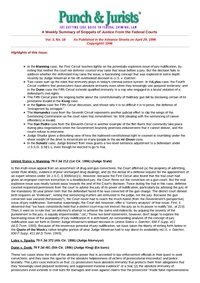This case involves one of those emerging technical Guidelines' issues that incites people to scream "Ay Caramba"! Here, the Seventh Circuit joins a growing number of courts that have recently held that the Sentencing Commission's 1994 Guideline Amendment No. 506, which attempted to clarify some of the ambiguities about …
The defendant in this case, an incarcerated inmate, filed a Rule 41(e) motion for the return of property seized in connection with his arrests on drug related charges. While the court ultimately rejects the petition on various grounds, it does examine, at some considerable length, the interplay of Rules …
Here the court held that if an "Allen charge" (see Allen v. U.S., 164 U.S. 492 (1896)) is given, the Court must instruct jurors in substance that: "(1) members of both the majority and minority should reexamine their positions, (2) a jury has a right to fail to agree, …
This case explores the elusive concept of "entrapment by estoppel", which the Fifth Circuit observes "is applicable when a government official or agent actively assures a defendant that certain conduct is legal and the defendant reasonably relies on that advice and continues or initiates the conduct." The Court also …
In this multi-issue appeal from an assortment of drug and gun convictions, the Court affirmed (a) the propriety of admitting, under Rule 404(b), evidence of prior uncharged drug dealings; and (b) the denial of a defense request for the appointment of an expert witness under 18 U.S.C. § 3006A(e)(1). …
Case was remanded for a determination of whether the defendant had derived the illicit funds individually, rather than jointly, as required by Application Note 11 to § 2B1.1.
Here the Court rejected a challenge based on the use of impermissible uncharged misconduct evidence, holding that the Court has often approved the use of prior narcotics involvement to prove motive and intent.
One of the many issues raised in this case was a challenge by the defendant …
The defendant in this case, an incarcerated inmate, filed a Rule 41(e) motion for the return of property seized in connection with his arrests on drug related charges. While the court ultimately rejects the petition on various grounds, it does examine, at some considerable length, the interplay of Rules …
QUOTE OF THE WEEK - One of the most important cases of the 1990's was a little noticed decision written by Judge Thomas A. Wiseman of Tennessee in a case entitled United States v. Datcher, 830 F.Supp. 411 (M.D.Tenn. 1993). In that case, Judge Wiseman permitted a defendant in …
Here the Court held that "aggravated felony" as defined in the Immigtation and Nationality Act excludes drug offenses that are state, but not Federal, offenses.
But see U.S. v. Pornes-Garcia, 171 F.3d 142 (2nd Cir. 1999) for an extensive discussion of this case.
Court held that the facts in this case constituted one of the rare instances where the defendant was entitled to a sentence reduction for acceptance of responsibility despite his demand for a jury trial.
Judge Bennett gives one of his typically detailed and thoughtful analyses of an often …
Here the Court held that the Government had failed to show "use" of a firearm because the evidence simply demonstrated that the defendant carried six pipe bombs along with drugs in his briefcase "and nothing more" (id., at 216).
The defendant in this case, a long time snitch, sought a writ of mandamus and a temporary restraining order seeking a declaration that the institution of deportation proceedings violated his plea agreement because he alleged that the Government had promised him that he would not be deported. The Government, …
The defendant in this case was convicted on two drug counts, after a trial at which he testified. At sentencing, Judge Johnson accepted the recommendation of the Probation Office that the defendant receive a two level upward adjustment in his sentence for obstruction of justice, under U.S.S.G. § 3C1.1. …
